Philip Pullman
Philip Pullman Interview
Your books make me think about what it would mean if there were parallel universes. I suppose that in effect there are parallel universes, depending on the level of magnification of things.
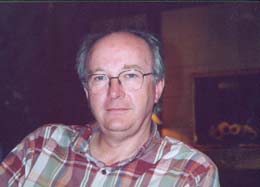 The further down you go in the scale of measurement, the weirder things get. By the time you get to quantum physics and quarks it is beyond the reach of logic or reason entirely. There are quite solid theoretical foundations to the idea of parallel worlds that would allow a multiplicity of universes differing in some slight degree: something falls down heads instead of tails. The guru of this idea, David Deutsch, argues that the existence of parallel universes explains certain puzzling phenomena, such as the wave/particle effect: if you fire a photon through a slit in a piece of card, the light has wave-like properties, though it’s only being fired one particle at a time. But, if in parallel worlds other photons are being fired at the same time, each individual photon would be part of a wave in a multiplicity of worlds, and that would explain why wave interference is manifested by the light particles in each of these worlds.
The further down you go in the scale of measurement, the weirder things get. By the time you get to quantum physics and quarks it is beyond the reach of logic or reason entirely. There are quite solid theoretical foundations to the idea of parallel worlds that would allow a multiplicity of universes differing in some slight degree: something falls down heads instead of tails. The guru of this idea, David Deutsch, argues that the existence of parallel universes explains certain puzzling phenomena, such as the wave/particle effect: if you fire a photon through a slit in a piece of card, the light has wave-like properties, though it’s only being fired one particle at a time. But, if in parallel worlds other photons are being fired at the same time, each individual photon would be part of a wave in a multiplicity of worlds, and that would explain why wave interference is manifested by the light particles in each of these worlds.
As a writer, how do you respond to that idea?
It’s full of possibility. Many stories depend upon the existence of other universes. All sorts of ingenious ways to get from one to another have been devised. Lewis Carroll gets Alice into Wonderland by going down a rabbit hole or through a looking-glass. In The Thirty-fifth of May, a wonderful children’s book by Erich Kästner (who is better known for Emil and the Detectives), a little boy called Conrad has to do an essay about the South Seas; he grumbles about this to his uncle who takes him to the back of a wardrobe and there they find themselves magically transported to the South Seas. I wonder if that gave C.S. Lewis the idea of wardrobes as an entrance to another world?
C.S. Lewis’s Narnia books have a level of Christian allegory. I gather you’re not keen on that sort of thing.
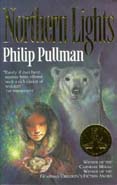 What I don’t like is the notion that the world is a cruel and imperfect copy of something much better somewhere else. Seen from that perspective, which is not exclusively Christian, life is shabby and second rate, shot through with failure and corruption and evil. Both C.S. Lewis and Tolkien seemed to believe this, but I don’t, not for a second. In my trilogy ‘His Dark Materials’, I bang the drum for the primacy of the physical world that we live in. As far as I can see we only get one shot at life, and that is in the here and now. It’s a sort of betrayal of life to long for death, as C.S. Lewis expresses in the Narnia books, which climax with the children being killed in a railway accident; their deaths are presented as a release from this ghastly life on earth. I think it would have been a braver – even, a more Christian – choice for Lewis to have let those children grow into fulfilled adulthood.
What I don’t like is the notion that the world is a cruel and imperfect copy of something much better somewhere else. Seen from that perspective, which is not exclusively Christian, life is shabby and second rate, shot through with failure and corruption and evil. Both C.S. Lewis and Tolkien seemed to believe this, but I don’t, not for a second. In my trilogy ‘His Dark Materials’, I bang the drum for the primacy of the physical world that we live in. As far as I can see we only get one shot at life, and that is in the here and now. It’s a sort of betrayal of life to long for death, as C.S. Lewis expresses in the Narnia books, which climax with the children being killed in a railway accident; their deaths are presented as a release from this ghastly life on earth. I think it would have been a braver – even, a more Christian – choice for Lewis to have let those children grow into fulfilled adulthood.
The findings of modern science are mysterious enough.
It’s just a wonderful gift for a storyteller to discover that most of the universe is made of this stuff called dark matter that nobody knew about until very recently. Astronomers don’t know what it is. Nobody knows. That gives you a licence to imagine anything.
Children find wonder in all sorts of everyday things. For instance, I used to lose myself watching dust motes in a shaft of light.
That is a wonderful thing to look at. You can and sit and watch that sort of thing for hours and hours. I remember as a child, in my grandfather’s house, looking at the sparks gather on the soot at the back of the coal fire like living things, then they would fly away up the chimney. We’ve lost a great deal since fires went out of common use. You can see all the environmental reasons against them, but you don’t get the same feeling from the radiator or the telly, and when you watch telly everything’s done for you.
Has your visual imagination altered much since childhood?
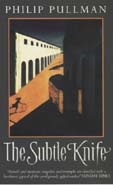 I think it’s probably more vivid now because it’s more practised and I’ve got a bigger repertoire to fall back on. I’ve learned to educate my eye by drawing. When you start to learn to draw you realise that you’ve never seen anything properly before. Visual imagination is intrinsic to my storytelling. It’s a matter of making aesthetic patterns. In the early stages of a long story that I can’t see the end of, I establish patterns. For instance, I invented a big battle in the clay beds between Lyra’s friends and the clay burners’ children. When I wrote that, it was just for contrast – you put a bit of blue here to contrast with the yellow down there, so when you stand back and look at them, the effect is good. You are never sure of the significance that things are going to have. It’s just playing with forms and shapes and colours. Later on you see the significance the pattern could have in narrative terms or in moral terms, but those things don’t come first.
I think it’s probably more vivid now because it’s more practised and I’ve got a bigger repertoire to fall back on. I’ve learned to educate my eye by drawing. When you start to learn to draw you realise that you’ve never seen anything properly before. Visual imagination is intrinsic to my storytelling. It’s a matter of making aesthetic patterns. In the early stages of a long story that I can’t see the end of, I establish patterns. For instance, I invented a big battle in the clay beds between Lyra’s friends and the clay burners’ children. When I wrote that, it was just for contrast – you put a bit of blue here to contrast with the yellow down there, so when you stand back and look at them, the effect is good. You are never sure of the significance that things are going to have. It’s just playing with forms and shapes and colours. Later on you see the significance the pattern could have in narrative terms or in moral terms, but those things don’t come first.
Where did you get the idea of using gypsies in your stories?
At first the gypsies were an improvised solution to a narrative difficulty. I needed someone into whose hands Lyra could fall, but where she would be safe. She’s running away from danger and doesn’t know where to go or what to do. When she comes across the gypsies she is terrified, but it turns out that they are friendly. As a reader, I have always liked this sort of reversal of expectations and feelings – there is something very attractive about the idea of a character falling into what you think is danger, but which turns out to be the real safety; or in contrast, things you think safe turning out to be dangerous.
The gypsy theme connects with what we were just talking about, setting up patterns. I knew I wanted to involve water in the story. The idea of waterways and boats linked up in my mind to the picture I had been building of Lyra’s childhood in Oxford – in particular, the area by the canal called Jericho, where she falls into the hands of the Gyptians, seasonal horse-trading people with a canal boat culture. They smuggle her out of danger into the heart of their watery kingdom in East Anglia. In Lyra’s parallel world the area of the Fens hasn’t been drained – as it has in our world – it’s still a complicated maze of rivers. Somehow, I had a feeling that the Gyptians would have a lot of Dutch in them – perhaps because there has always been a lot of commerce between the Fens and the Low Countries. And so their language contains Dutch words and speech rhythms.
At the end of Northern Lights Lyra moves from her world into a parallel world – what we know as the ‘real world’ – which is intriguingly similar to and different from her own. Even when technologies are much the same, they might have different names. Our word ‘electricity’ has a Greek root, whereas its equivalent in Lyra’s language is ‘anbaric’, which has a Latin root.
Anbaric is actually from Arabic – the word ‘anbar’ is the root of our word ‘amber’. In the beginning of The Subtle Knife – which is set in ‘our’ world – when Lyra meets Will for the first time she refers to street lights as ‘anbaric lights’. Will says, ‘No, they are electric lights’; to Lyra ‘electric’ is the tawny stuff that you get out of trees, which he calls ‘amber’; then the difference of terminology dawns on them, they realise that the connection between their worlds meshes here in the form of language. Incidentally, the word amber foreshadows its important role in the third book in the trilogy, The Amber Spy Glass.
Apparently Arthur C. Clarke once said that the more sophisticated the technology, the less it can be distinguished from magic. Moving on to fairy stories, were they much of an an influence on you?
Not much. Hans Christian Andersen certainly possessed the extraordinary talent of inventing stories that seemed like ancient folk tales. I must have absorbed those from a very early age. But I preferred the more authentic stuff you get in the tales of the Brothers Grimm or in Andrew Lang’s ‘coloured’ fairy books. Later I was entranced by Italo Calvino’s Italian fairy tales.
As a child, were there any book illustrations that you used to get lost in?
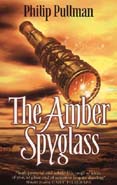 In my local library in Battersea I came across an English translation of Paul Berna’s A Hundred Million Francs, an exciting book about a gang of working-class Parisian kids who had a wooden horse on wheels which they would sit on and ride down the hill. It turned out that some bank robbers had hidden their stash of money in the horse and the bad guys kept trying to take the horse away from the kids. The book was illustrated in pen and ink by Richard Kennedy. One drawing was of a very tough scruffy girl, aged about eleven, with blonde hair and big dark eyes, wearing a leather jacket. I fell in love with that illustration. Marianne she was called.
In my local library in Battersea I came across an English translation of Paul Berna’s A Hundred Million Francs, an exciting book about a gang of working-class Parisian kids who had a wooden horse on wheels which they would sit on and ride down the hill. It turned out that some bank robbers had hidden their stash of money in the horse and the bad guys kept trying to take the horse away from the kids. The book was illustrated in pen and ink by Richard Kennedy. One drawing was of a very tough scruffy girl, aged about eleven, with blonde hair and big dark eyes, wearing a leather jacket. I fell in love with that illustration. Marianne she was called.
I found Lyra a very attractive character. But she really is a liar, and adapts her account of herself and her accent according to who she’s with.
Well, children do. I remember that from my own childhood. My family travelled about a lot Australia, southern Africa, England and Wales. When I was eleven I started school in Wales. The first lunchtime I got into a fight because I was from London. The next day my accent was Welsh. As you say, Lyra is a liar, a storyteller. At the beginning I didn’t know why she had to be. The reasons became clear to me when I was working on The Amber Spy Glass. In that book there had to be some great conflict, some danger that she had to go into and could escape from only by using the qualities that she brought with her: in the world of the dead the ghost children ask her to talk about the real world and the physical sensations they can’t feel. Lyra’s gift for storytelling makes it possible for her to lead the children out of the world of the dead.
Tell me about the alethiometer.
I love the beauty of mechanical devices – orreries, watches, compasses. The alethiometer came out of my interest in the Renaissance, the world described so vividly by Frances Yates in The Art of Memory and The Rosicrucian Enlightenment. During the Renaisssance there was a rediscovery of Greek philosophy, and a fascination with what we now call the occult, astrology and alchemy. Nobody was really sure of what worked, and what didn’t, but the attitude was, it all might, so we might as well try it all. Frances Yeats describes the ‘memory theatre’, an imaginary construction that you gradually accumulate in your mind; part of rhetorical technique was to memorise every detail of this complex building, and use it to remember the points in a speech by placing them in the form of vivid images – a bleeding corpse with its throat cut, or a crow with a gold nib in its beak – in their appropriate place in the building, and walking through it in your imagination helped you remember everything you had to say in the right order. This fascinated me and I looked at emblem books which had the same notion. When you look at the pictures, at first they look like surrealist images, but quite the reverse – instead of being illogical, dream-like constructs, they always have precise meanings. For instance, an anchor always means hope. This notion of embodying moral and philosophical ideas in pictures is what lay behind the alethiometer, a device for the divination of truth that works a little like a clock or a compass. Lyra discovers she has the power to read it intuitively. The moment she falls in love with Will and takes the first steps towards growing up, she loses this power which is part of the grace that children have. Children move and run beautifully, they dance perfectly, they sing freely, they paint the most marvellous pictures. Then towards adolescence they become self-conscious. I wanted Lyra’s gift of being able to read the alethiometer to leave her at that stage. But she can regain it, and that’s the point. It is recoverable, but only through study and education and all these dull things. At the end of the period of diligent toil that she must now undergo, she will be able to read the alethiometer better than she ever did, and the knowledge she has of it will no longer be unconscious. She will be able to make conscious connections – she will see why an anchor means hope, where previously she just ‘knew’ that it did. When the intuitive way of reading the alethiometer leaves her she feels a terrible loss; but in growing up there is another prize, which is conscious reason.
Have you ever yourself had any experience that could be described as a state of grace, or mystical?
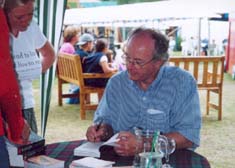 Yes I have. Usually outdoors. Not very often, I may add. Probably only three or four times. It is to do with seeing things more clearly. Mystical experience is sometimes described as a cloudy state when the real world dissolves. For me it has not been like that, or else, what I have had has not been mystical experience. What I seemed to feel, was that I saw the connections between things much more clearly, much more vividly. There were patterns, there were correspondences, there were shadows here of something there, everything was connected. With enormous excitement, I could see that the universe was alive and I was part of it. I saw this so clearly and intensely that I don’t think I could sustain that state for very long.
Yes I have. Usually outdoors. Not very often, I may add. Probably only three or four times. It is to do with seeing things more clearly. Mystical experience is sometimes described as a cloudy state when the real world dissolves. For me it has not been like that, or else, what I have had has not been mystical experience. What I seemed to feel, was that I saw the connections between things much more clearly, much more vividly. There were patterns, there were correspondences, there were shadows here of something there, everything was connected. With enormous excitement, I could see that the universe was alive and I was part of it. I saw this so clearly and intensely that I don’t think I could sustain that state for very long.
Do you think that there is such a thing as wisdom?
Yes there is. And it is to do with that sense of the connection between things, and the meaning of things. Which is the same, actually. The meaning of something is its connection to other things. The more connections you see, the more meaning you see.
Do you think in words, or non-verbally?
Because I know that you can tell stories in many other media than words – by pictures, mime, music – I know that words are not fundamental. The mistake some literary theorists make is to think that language is fundamental – it isn’t. Stories are not necessarily made of words. Story-making is not purely a literary activity. Literary activity is concerned with making sentences and paragraphs, but you can make a story out of things other than words. So when I conceive a story, it’s not necessarily in words. I don’t know what the medium is – it’s pre-literary. But I do take very great care with the words I use. I have several dictionaries beside me as I work and take pride in knowing what words mean and making the thing work in a literary way as well as I possibly can. But that isn’t the fundamental thing. There are plenty of people who are great literary craftsmen who can’t tell stories. And there are many marvellous storytellers whose words come over as no more than a collision of dull clichés, but you read on with thudding heart, anxious to know what happens next. The ideal is when you get both.
Northern Lights (£6.99 PBK, ISBN 0590660543), The Subtle Knife (£6.99 PBK, ISBN 0590112899) and The Amber Spyglass (£6.99 PBK, ISBN 043999358X) are all published by Scholastic Point.
© Jennie Renton 2005.

Comments